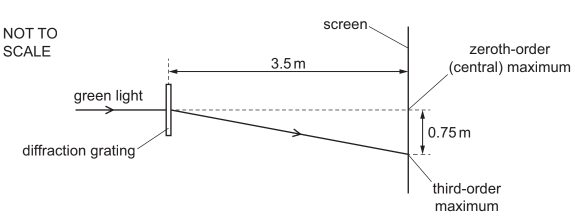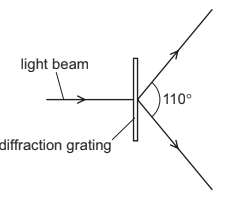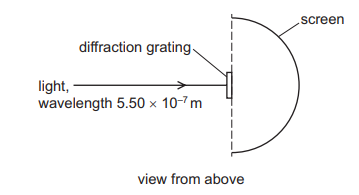Question
A parallel beam of light of wavelength 600 nm is incident normally on a diffraction grating.
The distance between adjacent slits in the grating is 2.0 × $10^{-6}m^{}$. A screen is placed parallel to the grating, at a distance of 1.50 m from the grating. Third-order diffraction maxima are observed at the two ends of the screen, as shown.

What is the distance between the two ends of the screen?
(A) 1.4 m
(B) 2.7 m
(C) 3.1 m
(D) 6.2 m
Answer/Explanation
Ans: D
Question
Green light of wavelength 550 nm is incident normally on a diffraction grating and produces a diffraction pattern on a screen placed 3.5 m from the diffraction grating.
The third-order maximum on the screen is a distance of 0.75 m from the zeroth-order (central) maximum.

What is the distance between two adjacent slits in the diffraction grating?
(A) $2.6 × 10^{–6} m$
(B) $7.7 × 10^{–6} m$
(C) $7.9 × 10^{–6} m$
(D) $1.0 × 10^{–5} m$
▶️Answer/Explanation
Ans: C
Question
A beam of light from a laser is incident normally on a diffraction grating.

The diagram shows only the second-order maxima that are produced.
The grating has a line spacing of $1.0 × 10^{-6}m$. The angle between the two second-order maxima is 110°.
What is the wavelength of the light?
(A) $4.1 × 10^{-7} m$
(B) $4.7 × 10^{-7}m$
(C) $8.2 × 10^{-7} m$
(D) $9.4 × 10^{-7} m$
▶️Answer/Explanation
Ans: A
Question
Light of wavelength \(5.50 \times 10^{–7} m\) from a laser is incident normally on a diffraction grating. The diffracted light is incident on a semicircular screen, as shown in the view from above.

A total of 9 bright dots are formed on the screen. The grating is at the centre of the semicircle. The lines of the grating are vertical. The separation between adjacent lines in the grating is d. What is a possible value of d ?
A \(2.25 \times 10^{–6}m\)
B \(2.80 \times 10^{–6}m\)
C \(4.40 \times 10^{–6}m\)
D \(4.95 \times 10^{–6}m\)
▶️Answer/Explanation
Ans A
